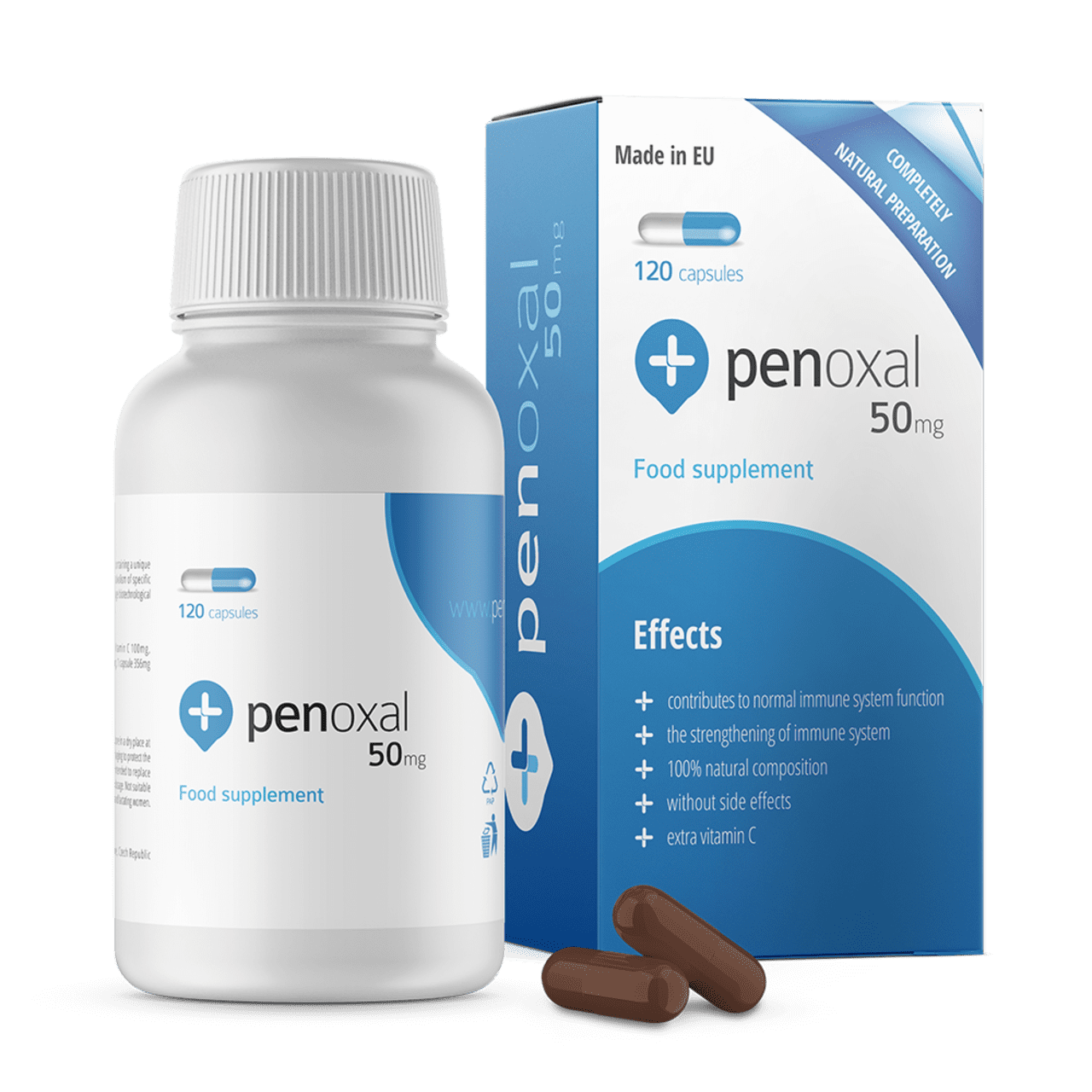Penoxal strengthens immunity
Penoxal has a 100% natural composition enriched with vitamin C and beta glucan, which contributes to the normal function of the immune system.

Biocol is a unique, patented, natural substance acquired from a complex biotechnological procedure and followed by standardisation in compliance with the most stringent hygienic and technological standards. It is a product of metabolism of the Talaromyces purpurogenus microorganism.
Talaromyces purpurogenus is a strain of genetically unmodified microscopic fungi, a natural microorganism which was discovered on the soil of the Ararat plain in Armenia during a screen testing in 1972.
A long-term collaboration of scientists from medicine and biochemistry enabled to discover some unique microorganism characteristics. Its ability to produce red pigments and its original dynamics of biosynthesis and bioactivity was very different from other microorganisms being known until then. The more significant fact, however, is the final product of manufacture – the Biocol active substance which contains really precious bioactive agents that excel in their ability to positively influence the immune system. Further research and findings on this specific microorganism have revealed its potential to influence and inhibit cancerous growth.
We focus on the production and sale of PENOXAL dietary supplements. Our products are completely free of preservatives, artificial colors and have no side effects. They contain the active substance Biocol, which was discovered already in 1972.
Biocol effects have been tested in many experimental and clinical trials which showed that it hindered the growth of tumors due to its impact on the immune system, which happens via the so called apoptosis, a process of programmed cell death.
The regulation of a cell life span is a precisely programmed mechanism. If harmony between the cellular division and its ageing process is disrupted, it may cause the cell to change from a healthy one to an impaired or cancerous one (i.e. oncogenesis). For organism’s healthy functioning, its ability to normalise oxidation processes, including apoptosis, is important, because the failure to do so may lead to the onset of cancer. Biocol has an excellent ability to block the undesired oxidation processes and apoptosis, and to normalise the programmed death of impaired or damaged cells, in this way it contributes to lower the risk of cancerous growth.
Another beneficial property of Biocol is its ability to influence the function of B and T-lymphocytes (specific groups of white blood cells), that contribute to appropriate functioning of the immune system. Lymphocytes are body’s essential cells, their dysfunction may lead to a so called immunodeficiency (weakening of the immune system) or to the onset of autoimmune disorders.
B-lymphocytes excel in their ability to identify foreign microorganisms (antigens) in the human body and consequently to create antibodies (specific proteins) that are capable of fighting against the antigens.
T-lymphocytes on the other hand, eliminate (engulf) the foreign cells directly, including damaged or cancerous cells, and cells affected by a virus, in this way they ensure cellular defence.
The most significant subgroups of T-lymphocytes affected by Biocol are marked as CD4+ and CD8+.
CD4+ lymphocytes called helpers aid the other lymphocytes to take part in the immunity process in 2 ways: their ability to engulf damaged cells (cellular immunity) and to produce antibodies against those cells. This is why their impairment results in a reduced resistance of the body.
CD8+ lymphocytes called cytotoxic cells contribute to the killing and elimination of diseased cells. They are able to force such cells to apoptosis (programmed death) or eliminate them by their own mechanisms. By doing so, they contribute to anticancer immunity.
A ratio between these groups of T-lymphocytes is important; it is expressed by a so called immunoregulatory index. This index tends to be prominently reduced in some viral infections (e.g. AIDS), and its lower values are associated with an immunopathological state, i.e. body’s low reactivity to pathogenic (foreign) agents.
Biocol promotes body’s detoxifying processes, and its antioxidant activities help to neutralise adverse effects related to oncological and antibiotic treatments.
It promotes an adequate functioning of the digestive tract – it regulates stomach acidity and boosts the required intestinal microflora, it also adjusts stool (diarrhoea, constipation). This positive influence on the digestive tract can be utilised when treating stomach or duodenal ulcers, Crohn’s disease, coeliac disease, ulcerative colitis, diverticulosis or colon polyps. These diseases are most frequently associated with the disruption of mucosa due to inflammation, hence appropriate immunity support with the smooth functioning of the digestive tract may limit a malignant reversal.
Biocol is also used in gynaecology, where it counteracts adverse effects of the microorganisms in vaginal mycoses or HP viruses that may cause precancerous changes in cervix, or genital warts. By harmonising the individual organ systems Biocol contributes to the organism’s healthy functioning and general well-being.
Discovery of a microorganism Talaromyces purpurogenus
Patenting the microorganism in the USSR
Research and breeding of the microorganism and new strain cultivation
Identification of Biocol (Public Health Office in Prague) Expert opinion on the active substance in the form of a dietary supplement (NIPH) and launch of the first sales Introducing the product Biocol under the same trade name
Patenting the microorganism in over 130 countries worldwide Toxicology studies (Research Institute for Pharmacy and Biochemistry Prague, RNDr. Jiri Marhan)
Research and launch of the biotechnological manufacture in Unichov
First studies to testanticancer effects of the active substance (RCD s.r.o, RNDr. Pavla Pouchkova, CSc.)
Second study to testanticancer effects of the active substance on human carcinoma (RCDs.r.o., RNDr. Pavla Pouchkova, CSc.) Determination of the active substance bioactive properties (The Czech Academy of Sciences, Department of Immunology and Photobiology, MUDr. Petr Shima Approval of the dietary supplement Biocol by the Ministry of Health, Ref. No. OVZ-350.1.8.0526664/2
Introducing Biocol under a brand name of Gesavit® – 10mg and 50mg with beta-glucan,to the Czech market
Introducing Biocol under a brand name of Penoxal – 50mg with beta-glucan, tothe international markets
Gesavit® clinical studies at University Hospital in Pilsen (Department of Gynaecology and Obstetrics, Doc. MUDr. Zdenek Rokyta, CSc.)
Penoxal clinical studies in 115 patients at the National Centre of Oncology in Yerevan
Gesavit® clinical studies at the Department of Gynaecology and Obstetrics in Prerov Hospital Gesavit® clinical studies at the Oncology Department in Vsetín Hospital
Marketing strategy planning for the Czech Republic and abroad Rebranding the Biocol containing products to Penoxal Purchase of the Gesavit® trademark and end of sales of the products under this name Launching sales of Penoxal products
Active substance Biocol has been developed from the microorganism called Talaromyces purpurogenus, which is a genetically modified strain of microscopic fungi discovered in 1972 in Armenia’s Ararat plain. As part of the following research onthe mechanism of biosynthesis in order to gain an active industrial strain, a selection of suitable strains during direct biosynthesis regulation and activation of enzymatic systems were performed. Throughout the entire research, no mutagenic substances were used that would cause a genetic modification of the microorganism.
For the purposes of pharmaceutical use, this microorganism comes from a complex biotechnological modification which allows Biocol in the form of red powder to be applicable and safe to health. In 1996 the substance was identified by the Public Health Office in Prague, and the National Institute of Public Health elaborated expert opinions on the usage of Biocol in dietary supplements. Thus the first marketing activities began in the Czech Republic.
In 1998 the microorganism was added to the Czech Collection of Microorganisms (CCM) in Brno. Then Biocol was patented worldwide and the toxicological studies on its health safety were conducted in the Research Institute for Pharmacy and Biochemistryin Prague. The studies confirmed that even the highest dose (2000 mg per kg) was not associated with any signs of toxicity or changes in behaviour of the animals tested. The hepatotoxic (liver toxicity) and nephrotoxic (kidney toxicity) undesirable effects were also ruled out, and no organ changes or changes to the genetic material (in chromosomes) were found.
Since 2003 the Biocol substance had been tested for anticancer effects, and itsimpact on organism due to the content of bioactive substance. The testing was performed for colon and breast carcinoma, melanoma, leukaemia and Lewis lung carcinoma. The studies demonstrated that Biocol significantly slowed down the growth of carcinoma and partially increased the number of white blood cells involved in the immune response. The best results were achieved particularly in the colon and mammary gland cancers where Biocol which showed to prolong life of the tested animals with a statistical significance (Preclinical studies).
In 2005 Biocol was approved by the Ministry of Health in CR as a dietary supplement, hence nothing inhibited its use in the pharmaceutical industry. Biocol appeared on the Czech market in 2007 for the first time, named as Gesavit® which promoted digestive tract function during oncology treatments (colon carcinoma). In the following years it has secured a very good position on the Czech market and abroad due to its excellent results as a supplementary therapy, and for its ability to promote immunity. Moreover, in 2009 Gesavit® was tested for malignant gynaecological diseases (in Pilsen, Přerov and Vsetín).
BIOCOL PHARMA a.s. took over the project in 2016 in order to place Penoxal on the market and at the same time the company BIOCOL PHARMA a.s. bought the Gesavit® trademark, the sale of the product under this name was terminated and was replaced by the new name of the food supplement “Penoxal”.
Penoxal has a 100% natural composition enriched with vitamin C and beta glucan, which contributes to the normal function of the immune system.
